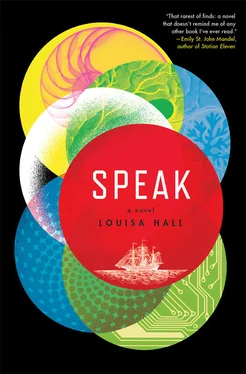I realize I should be counting my blessings. Our prison yard is in some ways quite pleasant. In a strange flight of fancy, a warden years ago ordered the construction of a Koi pond. It sits at the center of the yard, thick with overgrown algae. Newcomers are always drawn there at first, but they quickly realize how depressing it is. The fish have grown bloated, their opal bellies distended by prison cafeteria food. They swim in circles, butting their heads against the walls that contain them. When I first saw them, I made myself remember the feeling of floating, moving freely, passing under black patterns of leaves. Then I could summon a ghost of that feeling. Now, after years in my cell, it won’t come when I call it, which is why I stay away from the pond. I don’t like to remember how much I’ve forgotten. Even if, by some unaccountable error, I were to be released from this prison, the river I’m remembering no longer runs. It’s nothing more than a pale ribbon of stone, snaking through the hill country desert. Unbearable, to forget things that no longer exist.
That’s the general effect of those fish. Experienced inmates avoid them. We gravitate instead to the recreational center, which means the computers are in high demand. Soon, my allotted time will expire. And what will I do to amuse myself then? There are books — yes, books! — but nobody reads them. In the classroom adjacent to the computers, an overly optimistic old woman comes every Tuesday to teach us poetry. Only the nut-jobs attend, to compose sestinas about unicorns and erections. The rest wait for a turn to play Tetris, and I to write my wax-winged memoirs.
Perhaps I’m the nut-job, aggrandizing my existence so much. Perhaps my jury was right. I have always been proud. From the beginning, I was certain my life would have meaning. I didn’t anticipate the extent to which my actions would impact the economy, but even as a child I felt that the universe kept close tabs on my actions. Raised by my grandmother, I was given a Catholic education. I had religious tendencies. A parentless child who remembered his absent, drug-addled mother and father only in a mistaken nimbus of memory-dust, I found the concept of a semi-immortal semi-orphan, abandoned by his luminous dad, to be extremely appealing. I held myself to that standard. Early forays into the masturbatory arts convinced me I had disappointed my Father. My mind worked in loops around the pole of my crimes, whether onanistic in nature or consisting of other, subtler sins. In gym class, in the cafeteria, on the recess cement, when everyone else played games and jumped rope and gossiped among one another, I sat by myself, unable to escape my transgressions. Though I have been told I was an outgoing infant, I became an excessively serious kid.
Of course I was too proud. But you could also say the other kids were too humble. They felt their cruelties had no implications. They excluded me with no sense of scale. I at least knew my importance. I worked hard to be kind to my classmates. I worried about my impact on the environment. I started a club to save the whales that attracted exactly no other members. I fretted so much about my earthly interactions that I had very few interactions to speak of.
As such, computers appealed to me from the start. The world of a program was clean. If you were careful, you could build a program that had zero errors, an algorithm that progressed according to plan. If there was an error, the program couldn’t progress. Such a system provided great comfort.
One October afternoon, now edged in gold like the leaves that would have been falling outside, a boy called Murray Weeks found me crying in the back of the wood shop, having just been denied a spot at a lunch table on the grounds that I spoke like a robot. Murray was a sensitive, thin-wristed child, who suffered at the hands of a coven of bullies. “You’re not a robot,” he sighed, in a tone that suggested I might be better off if I were. As consolation for the pain I had suffered, he produced a purple nylon lunch bag and took out an egg salad sandwich, a Baggie of carrot sticks, and a box of Concord grape juice. I learned that he was a chess enthusiast who shared my passion for Turbo Pascal. Relieved of our isolation, we shared his plunder together, sitting on the floor, surrounded by the scent of wood chips and pine sap, discussing the flaws of non-native coding.
After that wood shop summit, our friendship blossomed, progressing with the intensity that marks most friendships developed in vacuums. The moment on Friday afternoons when we met up after school and retreated to Murray’s finished basement was the moment we were rescued from the terrible flood. We became jittery with repressed enthusiasms as soon as we ran down the carpeted stairs, giggling outrageously at the least approach toward actual humor. On Friday nights, Mrs. Weeks was kind enough to whip up industrial-sized batches of her famous chili dip. It fueled us through marathon programming sessions. In the morning: stomachaches, crazed trails of tortilla chip crumbs, and algorithmic victory. We sacrificed our weekends at the altar of Alan Turing’s Intelligent Machine, and faced school the next week with a shy, awkward god at our backs. We nurtured secret confidence: these idiots, these brutes, who pushed us on the stairs and mocked our manner of speech, knew nothing of the revolution. Computers were coming to save us. Through each harrowing hour at school, I hungered for Murray’s prehistoric computer. I wore my thumb drive on a jute necklace, an amulet to ward off the jeers of my classmates. Surrounded by the enemy, I dreamed of more perfect programs.
I realize I’m languishing in Murray’s basement, but from the arid perspective of my prison years, it does me good to recall Murray Weeks. Those weekends seem lurid in the intensity of their pleasures. My days of finding ecstasy in an egg salad sandwich are over. The food here is without flavor. Every day, the scenery stays the same: Sonic signs on the horizon and a fetid pond at the center. I haven’t seen a tree since I got here, let alone inhaled the fresh scent of wood chips.
From this position, it’s pleasantly painful to recall the vibrancy of those early years. What’s less pleasant — what’s actually too painful for words — is comparing my bond with Murray to my daughter’s single childhood friendship. All too well, I remember passing the door to Ramona’s bedroom and overhearing the gentle, melodic conversations she exchanged with her bot. She never suffered the whims of her classmates. Her experience of school was untroubled. She cared little for her human peers, so they had no power to distress her. In any case, they were similarly distracted: by the time Ramona was in third grade, her peers were also the owners of bots. Ramona learned for the sake of her doll. She ran with her doll so her doll could feel movement. The two of them never fought. They were perfect for each other. My daughter’s doll was a softly blurred mirror that I held up to her face. Years later, when she relinquished it, she relinquished everything. She stepped through a jag of broken glass into a world where she was a stranger. Imagine such a thing, at eleven years old.
Ramona, of course, has emerged from that loss a remarkable woman. She is as caring a person as I’ve ever known. I intended the babybots to show their children how much more human they were than a digital doll. When I speak with Ramona, I think perhaps I succeeded. But when I remember the riotous bond I shared with Murray — a thing of the world, born of wood chips and nylon and hard-boiled eggs — I wish for my daughter’s sake that my sentence had been harsher.
There are many punishments I can devise more fitting for me than these years in prison. What good does it do to keep me pent up? Why not send me with my dolls to old hunting grounds that then became ordnance test sites, then hangars for airplanes and graveyards for robots? Let me observe my daughter’s troubles. Send me with her when she visits those children. Or make me a ghost in my wife’s shingled house. Show me what I lost, what I abandoned. Spare me not her dwindling garden, the desert around her inexorably approaching. Show me cold midnight through her bedroom window, the sky stacked with bright stars, and none of them hospitable.
Читать дальше












